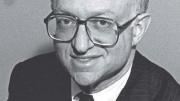The spring of 1933 was a trying time: the depths of the Depression, a new president scrambling to reverse systemic disasters and lift shattered spirits. Sound familiar?
During that Commencement week, the Phi Beta Kappa Orator was Connecticut governor Wilbur Cross—he of the eponymous parkway, and a thorough Yalie. In Connecticut Yankee, his autobiography, he called the invitation the “most signal honor in my literary career.” Taking as his cue Ralph Waldo Emerson’s famous “American Scholar” address, Cross told his audience “that 1837 and 1933 were alike in that they were both years of ‘economic confusion and public upheaval,’ and yet Emerson had no word about hard times, which must have been in the minds of all his hearers. ‘Looking beyond turmoil and distress, he did not let his gaze wander, for more than a moment, from the ultimate triumph of the human spirit over material things.’”
Cross noted that Archibald MacLeish (“another Yale man”—but also Harvard LL.B. ’19, Litt.D. ’55) delivered the PBK poem, “in which he retold the last incidents…of Ulysses’s 10 years of wanderings back to his…home which he had left peaceful and prosperous, only to find the land now in the throes of war and distress…a happy application of an ancient myth to the wide world in 1933.”
There will not be an in-person Commencement week this year. (Cross returned later during the 1933 hoopla to collect an honorary degree from retiring President A. Lawrence Lowell.) But however delivered or imagined, the 2021 counterparts to Cross and MacLeish’s common themes very much resonate during this year of pandemic, economic upheaval, political turmoil, and unaddressed racial and other inequities.
A Harvard figure one would wish on hand in the current economic distress is Martin S. Feldstein ’61, who died in 2019. The summa graduate joined the faculty in 1967, became a full professor two years later, and “perhaps uniquely among Harvard professors” was elected Chief Marshal of Commencement for his twenty-fifth reunion, as the memorial minute presented to the Faculty of Arts and Sciences in February records. But neither that honor, nor such professional accolades as election as president of the American Economic Association, most concerns us here.
What matters is that “his influence on economic policy was profound.” Liberals may not love his analyses of taxation, retirement, unemployment, and education financing, but he was driven, as the memorial notes, by a laudable motive: “If there was a better way to fulfill any of these public responsibilities, Marty wanted to learn what it was and then to educate the public about it and campaign for its adoption”—as opposed to trashing the public enterprise outright. In the fiercely partisan present, it is rare to imagine someone who could equal his feat of chairing Ronald Reagan’s Council of Economic Advisers and serving on Barack Obama’s Economic Recovery Advisory Board.
He was also a “phenomenal intellectual entrepreneur.” When he became leader of the National Bureau of Economic Research, it had 32 affiliated researchers. When he left, there were more than 1,000, their impact worldwide. That he relocated the NBER to Cambridge explains why the epicenter of leading economics research clusters along Mass. Ave.—at Harvard, the bureau, and MIT.
Come spring, and a Charles River upon which one can row, rather than stroll, crews will be eagerly at their sport again. Veteran journalist William Lanouette (a rower himself and a Kennedy School Shorenstein Center fellow in 1988-1989) offers interesting context on the sport’s professional origins in his new book, The Triumph of the Amateurs: The Rise, Ruin, and Banishment of Professional Rowing in the Gilded Age (Lyons Press). In passing, he examines the rivalry between Irish immigrants who worked around Boston harbor and “the entrenched Anglo-Saxons,…personified by the elite students at Harvard.”
In a June 1858 three-mile race for six-oared shells, the Harvard crew (not then confined to students) that beat three Irish American boats included future Harvard president Charles W. Eliot. He learned to row as a student, in a “wide-bodied lap-strake boat used to carry classmates into Boston for drinking bouts, the floor boards being ideal to ferry home, he recalled, those ‘members of the crew who did not propose to return sober’ to campus.”









